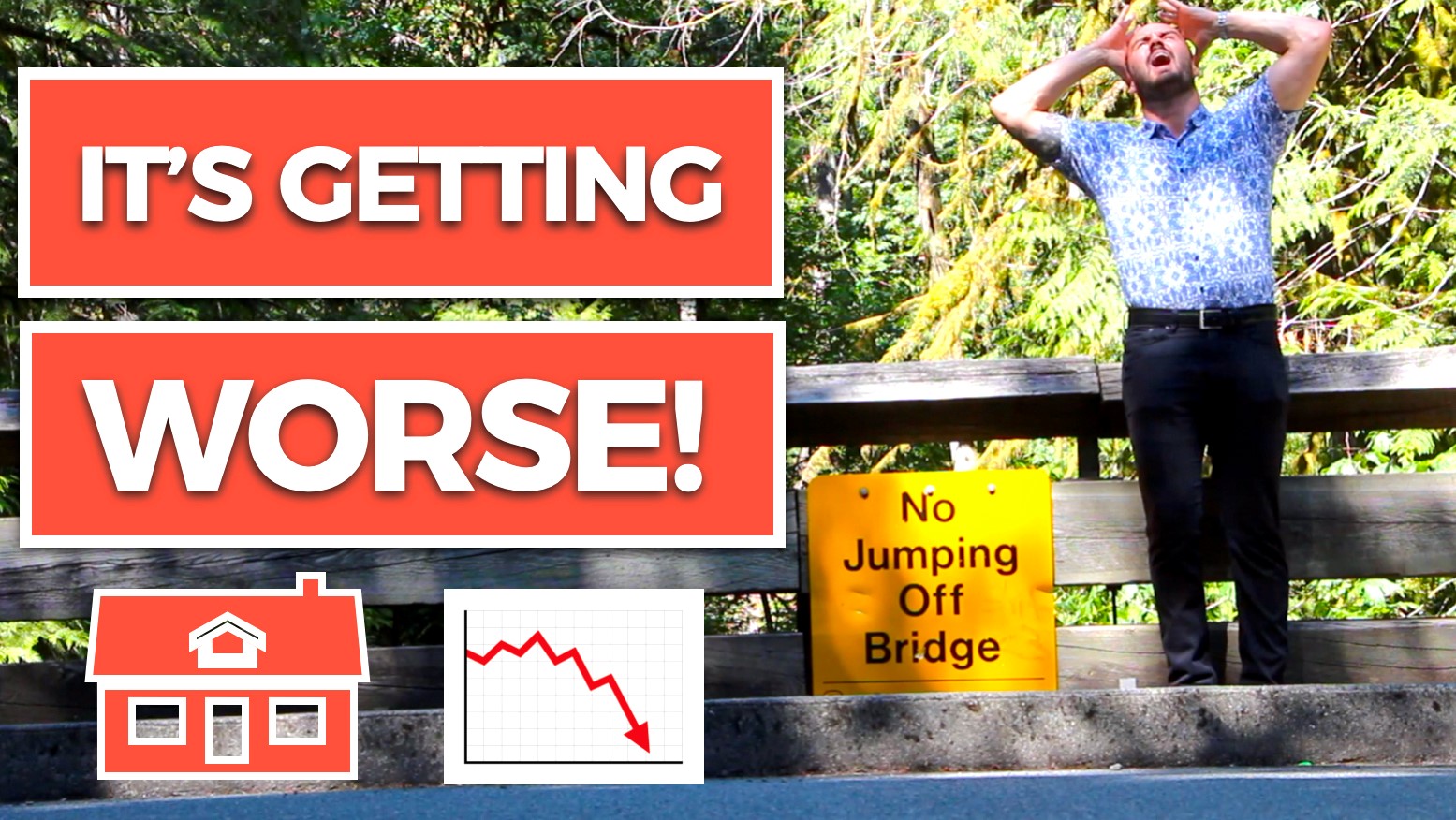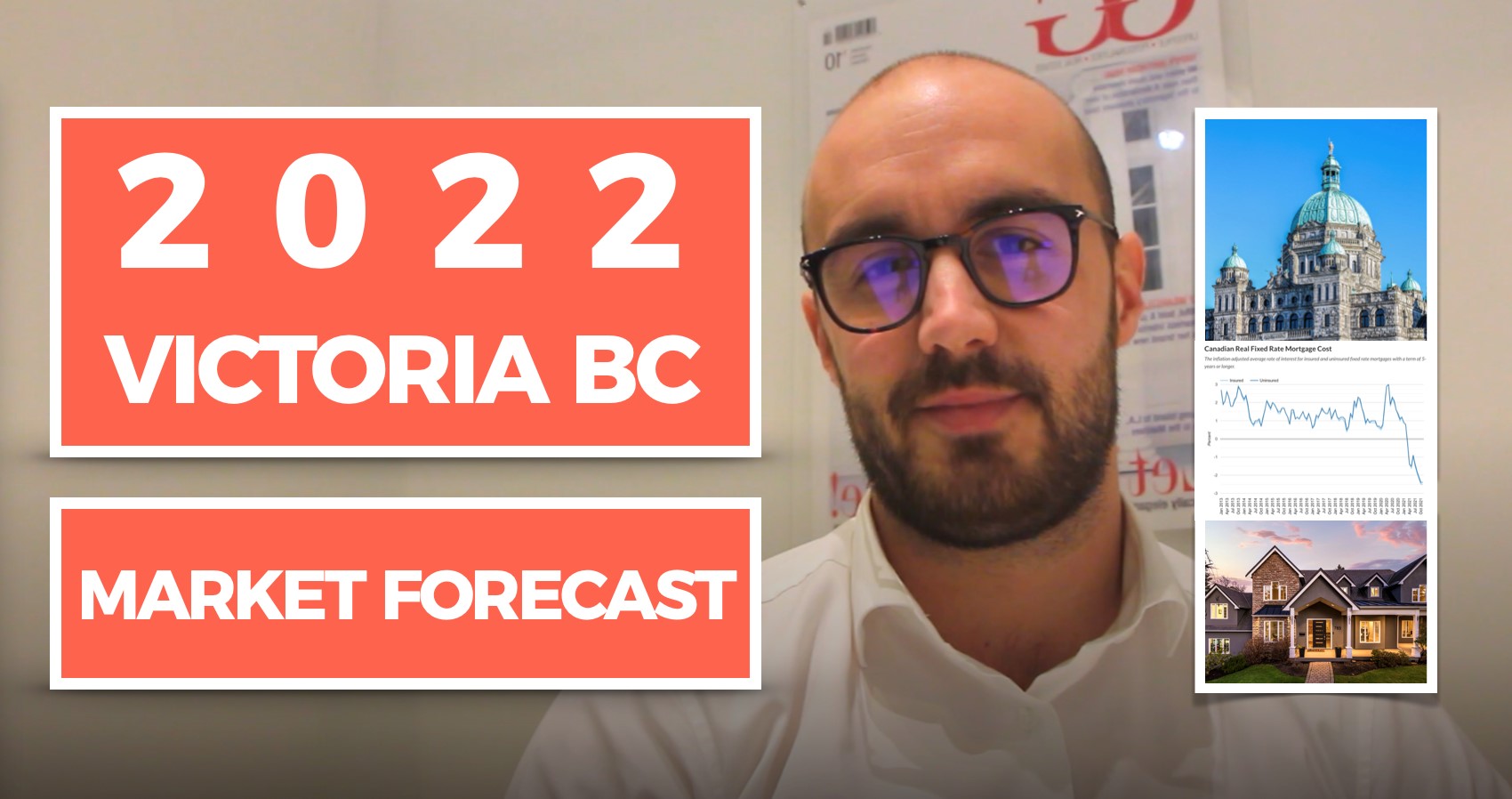I wanted to take a chance to answer the question – what the heck is going on in Victoria, BC’s real estate market?
These are unprecedented times, and we are seeing more of a rapid shift than I’ve ever seen in my career in real estate. How I would describe these changes in markets is that it feels a little bit like a ferry or large ship slowly changing directions. It takes a little bit of time and then eventually we get into a new market and a new normal. Real estate prices are a little bit sticky. It can take sellers a little while to get used to new prices and or changes in the way people are buying and selling real estate but this time around, it feels like someone yanking the e-brake and pulling a full 180 because, in four months, we’ve gone from 0.25% overnight interest rate from the Bank of Canada to 2.5% interest rate. Several significant things are shaping our real estate market at the moment and we’re going to get into those in this article.
Watch the video or skip past to the rest of the article.
In my mind, there are three main reasons why the market is changing as quickly as it is.
Reason number one is, it’s the summer! Canadians are enjoying the weather and vacationing with their families and real estate is further down the priority list. It feels like it’s the cautiously, semi-end of the pandemic and once again we’ve got beautiful weather. People are exploring, adventuring, and spending time with their families and enjoying our beautiful country in the summer. I don’t blame them for maybe shifting thoughts of purchasing a home a little lower on the priority list. Our seasonal sales in the summer do drop a little bit compared to the craze of the spring so it is quite normal that we see a little bit of a decline in housing activity through July and August and a historic change in the mortgage rates environment softening demand and buying power.
Reason number two is a huge change to mortgage rates and lending that’s affecting people’s purchasing power and what they qualify for as well as what they can sustain every month. That’s been brought on primarily by our central bank putting their foot down on inflation which they fear could become entrenched in the eyes of the Canadian consumer. Our most recent inflation rate was 8.1%, up slightly but below expectations from last month at 7.7% and we will have to see how much conviction they have moving forward. I think my expectation of the conviction level at the beginning of the year was a little bit underwhelming just because I wasn’t sure our central bank was willing to put us into a recession as a consequence of reaching their 2% target rate for inflation. It seems that is not the case and that the central bank is willing to do whatever is required to get us back to that 2% rate they’re talking about, reaching it by 2024.
So what does this mean for mortgage rates, lending, and what the average person is dealing with financially? Well, with the most recent, whopping 100 basis point move. It’s moved the ranks up on a variable mortgage to 4.2-ish% for most major lenders. The other effect that that’s had in on any lines of credit or HELOCs (home equity line of credit), which are affected by prime as well as limiting what people can qualify for because of our mortgage stress test. For those of you who are familiar with our mortgage stress test in Canada, it is either 2% higher than your contract rate or 5.25% at a minimum, so we saw a lot of people shuffling into variable mortgages as a consequence of the discount we had between variable and fixed mortgage rates at the earlier part of the year.
Now, that isn’t as much the case and the other factor is people are now being stress tested at 6.25%. So, from the moment that decision came out last week, we’ve seen borrowing power reduced by about 10%. Some positive news in mortgage land, for those of you that follow the five-year fixed mortgage you will have seen five-year government bond yield come off in the last month. That is effectively what prices those five-year fixed mortgages which have stabilized in the last few weeks, so for those of you looking at watching the trajectory of where those five-year fixed mortgages go, just watch that bond yield. I’m not sure if I can say they’ve peaked out just yet but because a recession is now being priced in, many of us are starting to feel like we’ve reached the peak of those five-year-fixed mortgages.
Reason three is a complete shift in buyer sentiment from the earlier part of the year. Back then feels like a long time ago now, it was the ultimate “FOMO” (fear of missing out) market. Folks were clamouring over limited property, and historically low inventory with the urgency that if they didn’t buy now, it would be out of reach forever. Whether it was a townhouse, condo, or detached home, they felt like it was their last opportunity to secure the property before Canadian housing continued to go up which it always has in some of their minds.
Now, that was not a healthy place for our market to be in and that has changed considerably to the point now where I feel there are a lot of buyers looking at the headlines: “overvaluations in housing”, “declining real estate prices”, “bubbly market” – all the buzzwords you want to throw at it that is affecting and becoming top of mind for many buyers and has changed the timeline that they see themselves getting into a property. So a lot of folks are currently looking at those headlines, they’re watching videos like this, they’re getting a feel and a pulse for the market and saying, you know what, I’m just going to see how this shakes out over the next few months because I think there could be more opportunities for me as 2022 progresses.
So how is that beginning to show up in the Victoria real estate market? Well, it’s beginning to manifest the data that I’m looking at in a very real way. From March and April, our average and median detached sale price is down $200,000 in both categories sitting here currently in July. Our five-year average for sales in the month of July is 808 sales and currently, as of July 18th we have 287 sales. At the midway point, we had just over 200 which looks like we may have one of the worst Julys on record as far as total sales on the Victoria Real Estate Board. I had to look back to the year 1990 and in 2000 we had 450 total sales in July, we could very well see a new low record for sales in July in the last 32 years in Victoria, BC. Highlighting the fact that there could be a little bit of pain to come here in the short term.
Those of you who know me know I’m very bullish over the long term on housing as an investment in Victoria, BC. I think this is one of the most incredible places in the world, and certainly is, in Canada and we shall see how this maps out. I wouldn’t be shocked if we saw rates get cut in 2023 but no crystal ball. Get solid advice, I’m always here to answer any real estate-related questions!
Another thing I should mention, just thinking about real estate and prices, I should mention that a Canadian rent report published by Zumper placed Victoria as the fourth most expensive place to rent out of all the major markets in Canada, falling just being Burnaby, Vancouver, and Toronto. So that is helping to support prices, as is our historically low inventory which is still not quite over the hurdle. Still, our sales to active listings ratio has changed to the point of us I would say entering a buyer’s market as we head into August.
Don’t hesitate to reach out and I hope you enjoyed this update, we’ll talk to you soon!



